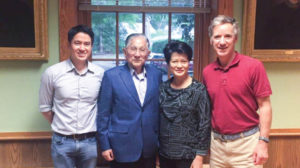
Originally from Thailand and studying in Hong Kong, Vuttichai Wanglee ’63 came to Williston Academy when his father asked that he learn English. The steep language and cultural barriers gradually faded away. By the time he graduated, Mr. Wanglee says he felt like a full member of the student body.
How was your life at Williston different from your life in Hong Kong, where you had been studying?
I was able to speak Chinese fluently while I studied in Hong Kong. I was very happy then. Life was also the same in Thailand, but the school in Thailand was very strict academically, especially every subject you have to memorize instead of using your own expression. Study in Hong Kong was more open. I was not used to expressing my ideas while I was at Williston because I was conditioned to accept everything when the teachers gave it to me. That was why I encountered some difficulty in expressing myself in class. In Hong Kong, it was more open but the teacher seldom asked the students to express their own ideas.
Which teacher had the most impact on you?
Mr. Hepworth, the U.S. history teacher, who inspired me to attend his class. He made every subject in U.S. history very interesting. I loved to study U.S. history. It is very interesting and especially during the expansion to the West, the Civil War, the Indian War. U.S. history was quite easy to understand and follow, unlike European history; it was full of unfamiliar words, especially Latin words.
What kind of student were you (shy, confident, a troublemaker, a class clown)?
I was shy, especially among American females. Maybe my English speaking ability was not up to par with the rest of the American students.
What’s a favorite memory of your time at Williston?
I have several: wearing a tie and jacket during the school day; taking turns waiting on the tables; wearing hats during the winter; attending Chapel on Sunday. The teachers and the school staff were very friendly and made me feel at home. During my last year at the school, I was really enjoying the life there. I was a part of the student body.
There weren’t as many international students at Williston in 1963 as there are today. What was it like to be an international student at Williston?
The first night, the police in Easthampton thought I was lost when I carried my luggage back to the school. I was very lonely at the beginning and I could not get along very well with the Americans due to the language barrier. I learned English very quickly and it was to my advantage when I met Thai students in the big cities and compared abilities to comprehend English. Schools in Thailand or Hong Kong did not stress sports. When I was at Williston, I was surprised that I was required to join the sport activities. However, this requirement built up my determination that if I want to send my children to the school in U.S., they must be able to join any sports. I have done so with my two sons and they joined Williston Northampton School.
